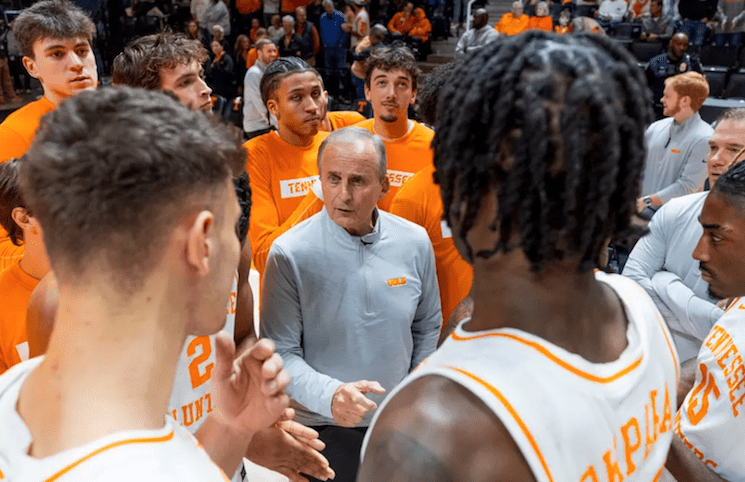
This Week in UT Sports History is a weekly column written by RTI contributor Lexie Little
Though football season does not kick off for another month and basketball follows even later, fans and analysts flock to social media to make their predictions for the upcoming year based on precedent. Athletes use the summer to condition and build resumes outside their universities. Athletic departments preview work on new or updated venues. Everyone looks to build on past successes as avenues to future feats.
Take a look back at such building moments in “This Week in UT Sports History.”
July 16, 2005
Tennessee Track star Toyin Olupona scorched summer competitors at the Canadian Track & Field Championships in Winnipeg, Manitoba, Canada, on July 16, 2005, to become Canada’s fastest woman on record to that date in the 100-meter dash. She recorded a time of 11.35 seconds to outpace her home country competitors.
Originally from Ontario, former All-American Olupona competed at Tennessee from 2002 until 2005. Her victory following her senior season at UT earned her a spot at the IAAF World Championships in Helsinki, Finland, where she advanced to the quarterfinal round before missing the mark in the third heat. She posted a time of 11.57, too far behind leader and Olympic gold medalist Chandra Sturrup of the Bahamas (11.10) to make the semi-final round.
During her final season at UT, Olupona finished runner-up in the 60-meter dash at the NCAA Indoor Championships in Arkansas, helping the Vols to their first national indoor team title. She held the school record in the event at 7.23 seconds and nearly tied her own record time at the championships, clocking in at 7.24 seconds.
“It was a great performance in the 60,” then head coach J.J. Clark said. “Toyin is a veteran, and her leadership really came through. Early in the season, she was not on her ‘A’ game, but she regrouped and closed out the indoor season in very impressive fashion.”
All 10 Lady Vol athletes competing at the 2005 indoor championships left as both national champions and All-Americans. Olupona’s preparation at Tennessee paved the way for her to continue competing on an international stage, and her win in Canada prompted a career extending into the 2010s. She won the 100-meter dash at the Harry Jerome International Track Classic in 2011.
Olupona’s leadership at Tennessee and Clark’s coaching formed a foundation for Lady Vol track to succeed in subsequent years. The UT women’s track team won the Southeastern Conference Indoor title in 2007 and another national title in 2009.
July 16, 2008
Expensive renovations and development marked former athletic director Mike Hamilton’s tenure, but no price was too high to maintain the hallowed southern colossus that is Neyland Stadium.
In November 2004, Tennessee announced plans for several phases of renovations to accommodate the 102,455 faithful who journey to watch the men in orange and white on Saturdays in the fall. Phase I wrapped up in 2006 with a $26 million price tag to add East Club seating, restrooms, additional concessions, and LED signs. On July 16, 2008, the university announced the notable Phase II progressed on track.
“Neyland Stadium holds a special place in the hearts of Tennessee fans everywhere. Over the past 87 years, it has grown to become one of America’s greatest football stadiums,” Hamilton, then men’s athletics director, said in a UT release. “I believe these renovations will enhance the fan experience for years to come.”
Phase II workers installed renovations now iconic to Vol fans. The project totaling $27.4 million initiated the construction of the brick work around field level, the addition of the Lettermen’s Room (Lauricella Center for Letter Winners) adjacent to the locker room, and renovations to the Peyton Manning Locker Complex to create a straight path to the field as the team exits to run through the “T.” Many recruiting and visitor photos feature the locker room upgrades.
Additionally, the renovations included construction of the Stokley Family Media Room, which sets the stage for post-game press conferences and coach/athlete interviews now widely disseminated across all media platforms.
The 2008 release also noted Phase II addressed ADA compliance, allowing fans of all abilities to access stadium ports with new elevators. As officials predicted, the stadium renovations were completed in time for the home opener that September.
UT Athletics funded each phase with private donations and revenue from club seating. Phase III, completed in 2010, furnished the West Club seats, Tennessee Terrace, and the General Robert Neyland Statue on the west side of the stadium through a large $83 million initiative.
Last May, current AD Phillip Fulmer said the Neyland Stadium project remained on track following approval from the UT Board of Trustees to commence two-part renovations set to cost nearly $340 million. The Board voted on plans in November 2017, when embattled John Currie held the top position in Tennessee Athletics before losing his position Dec. 1, 2017. The plans would include improvements to the stadium’s south entrances and concourses around Gate 10. However, in November 2018, Fulmer said the project needed to stay on hold as officials evaluate design and scope.
“We’re still looking at all the design, all the scope, and just what do we really want to do?” Fulmer said, as reported by the Knoxville News Sentinel. “What’s going to be the best for the next 100 years?”
Though future plans are not yet set in stone, the bricks laid in 2008’s Phase II still welcome Vol faithful every time it’s football time in Tennessee.
July 17, 2012
Basketball mania still grips Tennessee fans in 2019, with three Vols drafted earlier this year making waves in NBA summer play and former Lady Vol Kara Lawson joining the Boston Celtics staff.
But what was the buzz in 2012?
That July, the Cuonzo Martin-led Vol squad suited up for the first of 10 summer NCAA practices to prepare for an exhibition tour of Italy. The season prior, Tennessee finished fourth in the SEC with a conference record of 10-6 (19-15 overall) in Martin’s first season as head coach. New NCAA rules allowed additional instruction time that summer, giving Martin a chance to build his program ahead of international travel.
“We try to work hard, but also get better at the same time,” Martin said in an interview for utsports.com. “We’ll play professional teams…they’re legitimate ball players.”
Martin hoped to face those pro teams with a bonded group of players. Additional time over the summer would allow teammates to build relationships and function as a unit ahead of the 2012-13 season.
“Having 10 extra practices really helps,” Martin said. “Especially when they’re efficient. Ten practices give you an opportunity to accomplish a lot. For (the coaching staff), you always want to get better as a team. You want to get the new guys acclimated to what we do. And you want to reinforce your philosophies on both ends of the floor and continue to teach a level of effort, togetherness and toughness.”
The added practices also allowed for rehab time much needed for several players afflicted by knee injuries.
Senior forwards Jeronne Maymon and Dwight Miller faced some limitations while junior point guard Trae Golden jumped back into play following off-season knee surgery. Maymon’s knee problems, which started during his time at Tennessee, ultimately ended his professional basketball career in 2015. He had five knee procedures between 2013 and 2015, three coming in one calendar year.
Practice paid off for Golden, who later logged 13 points and four assists in the Vols’ first victory in Rome. Tennessee defeated All-Star Italy 83-32 on Aug. 8, 2012. The Vols did not lose a contest abroad, passing the century mark in the latter two match-ups.
Tennessee finished that season 19-13 overall (11-7 SEC), missing out on the NCAA Tournament for the second-straight year.



